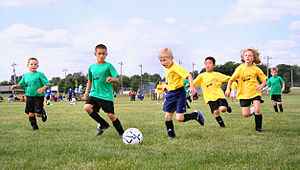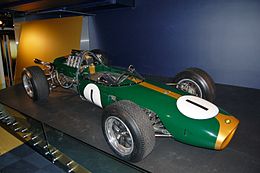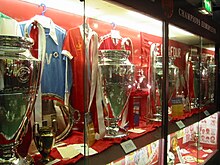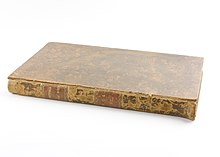Portal:Sports
The Sports Portal

Sport is a form of physical activity or game. Often competitive and organized, sports use, maintain, or improve physical ability and skills. They also provide enjoyment to participants and, in some cases, entertainment to spectators. Many sports exist, with different participant numbers, some are done by a single person with others being done by hundreds. Most sports take place either in teams or competing as individuals. Some sports allow a "tie" or "draw", in which there is no single winner; others provide tie-breaking methods to ensure one winner. A number of contests may be arranged in a tournament format, producing a champion. Many sports leagues make an annual champion by arranging games in a regular sports season, followed in some cases by playoffs.
Sport is generally recognised as system of activities based in physical athleticism or physical dexterity, with major competitions admitting only sports meeting this definition. Some organisations, such as the Council of Europe, preclude activities without any physical element from classification as sports. However, a number of competitive, but non-physical, activities claim recognition as mind sports. The International Olympic Committee who oversee the Olympic Games recognises both chess and bridge as sports. SportAccord, the international sports federation association, recognises five non-physical sports: bridge, chess, draughts, Go and xiangqi. However, they limit the number of mind games which can be admitted as sports. Sport is usually governed by a set of rules or customs, which serve to ensure fair competition. Winning can be determined by physical events such as scoring goals or crossing a line first. It can also be determined by judges who are scoring elements of the sporting performance, including objective or subjective measures such as technical performance or artistic impression. (Full article...)
Selected articles
Selected pictures
Did you know...
- ... that para-alpine B2 classified visually impaired skier Gabriel Gorce (pictured) was the youngest member of the 2010 Spanish Winter Paralympic team?
- ... that Caleb Moore became the first competitor to die as a result of injuries sustained during the X Games?
- ... that professional baseball player Tony Cingrani did not expect his college team to invite him back for his senior season after he struggled as a junior?
- ... that Vahram Papazyan and Mıgırdiç Mıgıryan, the two athletes who represented Turkey in its first-ever Olympics, were both ethnic Armenians?
- ... that Manny McIntyre was a member of the first all-black line in professional hockey history and the first known Black-Canadian to play professionally in organized baseball?
Selected quote
Selected athlete
Her successful amateur career included a win in the St. Rule Trophy played at St. Andrews and a runner-up finish in the Swedish national mother/daughter golf tournament. She moved to the United States to attend college at the University of Arizona. She won seven collegiate titles and in 1991, became the first non-American and first freshman to win the individual NCAA Division I Championship. She was 1991 NCAA Co-Player of the Year with Kelly Robbins, runner-up in the 1992 NCAA National Championship, 1992 Pac-10 champion and a 1991-92 NCAA All-American.
The winner of a record eight Player of the Year awards and six Vare Trophies, given to the LPGA player with the lowest seasonal scoring average; she is the only female golfer to have shot a 59 in competition. She holds various all-time scoring records including the lowest season scoring average: 68.6969 in 2004. Representing Europe in the Solheim Cup on eight occasions between 1994–2007, Sörenstam was the event's all-time leading points earner until her record was surpassed by England's Laura Davies during the 2011 Solheim Cup. (Full article...)
Selected team
Rugby was introduced to France in 1872 by the British, and on New Year's Day 1906 the national side played its first Test match — against New Zealand in Paris. France played sporadically against the Home Nations until they joined them to form a Five Nations tournament (now the Six Nations Championship) in 1910. France also competed in the rugby competitions at early Summer Olympics, winning the gold medal in 1900 and two silver medals in the 1920s. The national team came of age during the 1950s and 1960s, winning their first Five Nations title outright in 1959. They won their first Grand Slam in 1968.
Since the inaugural World Cup in 1987, France have qualified for the knock-out stage of every tournament. They have reached the final three times, losing to the All Blacks in 1987 and 2011 and to Australia in 1999. France hosted the 2007 Rugby World Cup, where, as in 2003, they were beaten in the semi-finals by England.
French international matches are played at several venues across the country; the Stade de France in the Paris suburb of Saint-Denis is used for their games during the Six Nations, and they have a formidable home record at the Stade Vélodrome in Marseille where they have only lost twice, to Argentina in 2004 and to New Zealand in 2009. (Full article...)
In this month
- June 6, 1946 – The Basketball Association of America, a predecessor to the National Basketball Association, is founded
- June 14, 1900 – The only game of Basque pelota (pictured) ever played in the Olympics takes place at the 1900 Summer Olympics
- June 15, 1909 – The international governing body of cricket, the International Cricket Council, is founded
- June 20, 1904 – Fédération Internationale de l'Automobile, the federation in charge of Formula One and World Rally Championship, is founded
- June 23, 1894 – Pierre, Baron de Coubertin founds the International Olympic Committee, the organizers of the Olympic Games and Youth Olympic Games
Topics
Related portals
Categories
Things you can do
 |
Here are some tasks awaiting attention:
|
Associated Wikimedia
The following Wikimedia Foundation sister projects provide more on this subject:
-
Commons
Free media repository -
Wikibooks
Free textbooks and manuals -
Wikidata
Free knowledge base -
Wikinews
Free-content news -
Wikiquote
Collection of quotations -
Wikisource
Free-content library -
Wikiversity
Free learning tools -
Wiktionary
Dictionary and thesaurus































































